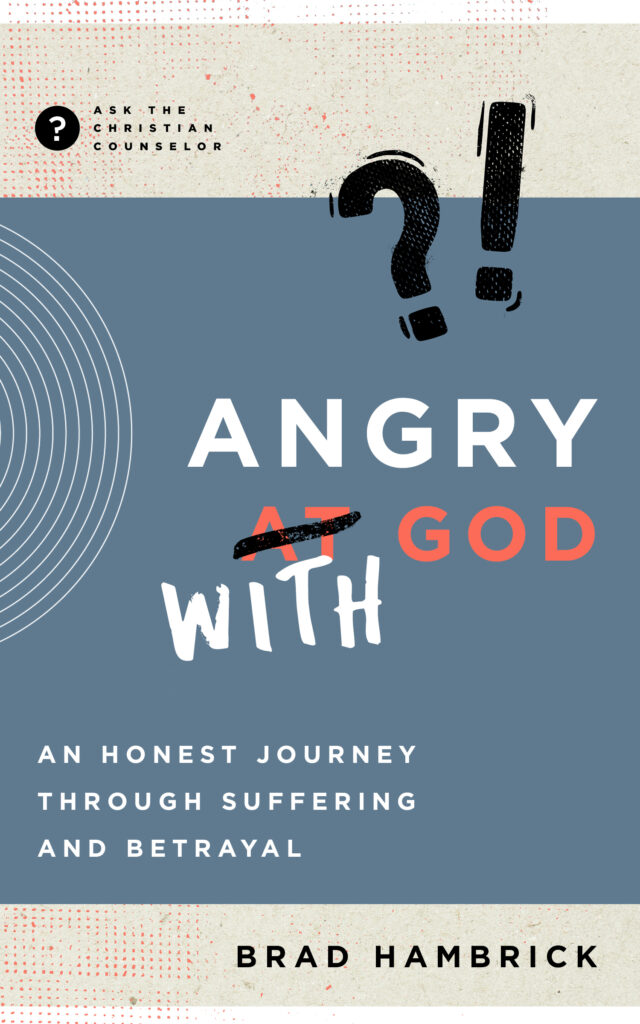You’ve likely heard, “Most people who abandon their faith do so because of personal pain, not theological confusion.” When someone questions, “Do I really want to be a Christian? Is the Bible true? Would life be better if I let go of my faith?” it’s usually not because they are stumped by the complexity of the Trinity.
We ask faith-shaking questions when life is overwhelmingly hard: our child dies, our spouse leaves, a spiritual leader betrays us, we get a devastating diagnosis, or a life dream crashes. If you have ministered in many of these situations, you know that caring for the experience of suffering is more important for soul-care than answering questions about the “problem of pain” (i.e., How can God be all good, all powerful, and evil still exist?).
One counterintuitive aspect of helping someone navigate intense experiences of pain is the reality that the anger (at least part of it) that emerges in these situations is a natural part of grieving. If we mistake all anger for selfish anger and don’t have a category for grief anger, we will be ineffective–maybe even harmful–in our care.
Let’s define these two concepts:
- Selfish Anger – This is the James 4 reaction to not getting our way. It reveals a heart that puts loving self before loving God and loving neighbor. It is anger that says, “I want what I want bad enough that I’m willing to sin against you to get it.”
- Grief Anger – This is a Psalm 44 response to living a broken world. It reveals a heart that is confused and disoriented because life doesn’t seem to be playing by the rules. It is an anger that says, “I’m hurt, confused, and raw. I can’t pretend everything is okay.”
When Anger Has Its Place
I Corinthians 15:26 says that death is the last enemy that will be destroyed. The language of enemy explains the role of anger in grief. During grief, our anger is affirming, “Yes, Lord, what prompted my pain is an enemy that needs to be destroyed. If your will were done on earth as it is in heaven, this would not be happening.”
This is why grief can have flashes of red (angry), and not be purely gray (sad). When we don’t see the role of anger in grief, we often stagnate in the anger phase of grief. We feel like God is against our anger, but we can’t say what happened was okay. We feel like our fellow Christians are naïve to what we’re going through because their expectations of a life of faith seem hyper-positive. As a result, we can be prone to feel that Christianity no longer can account for our tragic experiences.
God isn’t against our grief anger. He invites our mourning (Matthew 5:4). Many of our fellow Christians are not naïve to the experience of pain and would “weep with those who weep” (Romans 12:15), even hot tears. Christianity has far more grit than many of us have had to mine before we go through seasons of intense pain.
Some of us may still be leery of this category of hot lament. If that’s you, I would encourage you to read through the psalms of lament and Ecclesiastes. As you do, note the number of exclamation marks (!) in these chapters. These statements have heat and force behind them. God didn’t feel the need to edit these emotions out of the passages that speak most directly to our intense pain experiences.
There is a great deal of hope in that. God gets our pain, and his understanding gives us confidence to come to him with our pain (Hebrews 4:16). We don’t have to worry about burning God’s overly sensitive ears with the anger and confusion emerging from our grief. God wrote these emotions into the Bible passages he provided to give us words for these experiences.
Does this validate everything we think and feel in our grief? No. Does it legitimize anger as part of the experience of grief and give us the freedom to vet what we’re thinking in a friendly conversation with God? Yes. Otherwise, we respond to God with, “Why should I tell you what I’m thinking? I’m angry, so you’re just going to tell me I’m being bad.”
Being Angry WITH, Not AT God
Everything we’ve explored in this article is the difference between being angry at God and being angry with God. When we’re angry at God, it is because we think he is against us and how we feel, so we can’t come to him until our feelings are resolved. He won’t understand. But when we’re angry with God, we realize he is a source of comfort and refuge in our hardest times. We realize God is sturdy enough to help us navigate even our most turbulent emotions.
Where will our journey with God go from there? It will be different for each tragic situation and each person navigating a tragedy. But when we realize God is not against us or too fragile for our intense emotions, it frees us up to take these difficult journeys with God, and that makes all the difference.
Angry with God: An Honest Journey through Suffering and Betrayal
No one gets mad at God for something small. When we’re angry with God, it is because we’ve faced something immensely hard. Anger is an often-overlooked part of grieving, and as such, is an appropriate response to profoundly painful events. Counselor Brad Hambrick provides a guided process to being honest with God about your pain to restore and deepen your relationship with him.






